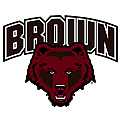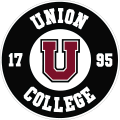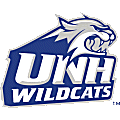 Brown
BrownNickname: Bears
Location: Providence, RI
Founded: 1764
Conference: ECAC (Ivy League)
National Championships: 0
Last NCAA Appearance: 1993
Last Frozen Four: 1976
Coach: Brendan Whittet (8th season)
2015-16 Record: 5-19-7 (3-13-6 ECAC, 11th place)
Series: RPI leads, 62-26-8
First Game: December 28, 1951 (Troy, NY)
Last RPI win: March 5, 2016 (Troy, NY)
Last Brown win: February 13, 2015 (Troy, NY)
2016-17 games: November 4, 2016 (Troy, NY); December 10, 2016 (Providence, RI)
Key players: G Tim Ernst, sr.; F Davey Middleton, sr.; F Zack Pryzbek, sr.; D Tyler Wood, sr.; F Tyler Bird, jr.; F Charlie Corcoran, jr.; F Sam Lafferty, jr.; D Josh McArdle, jr.; D Ben Tegtmeyer, jr.; F Max Willman, jr.; F Alex Brink, so.; D Max Gottlieb, so.; F Tommy Marchin, so.; D Brady Schoo, so.; D Zach Giuttari, fr.; G Gavin Nieto, fr.
Key losses: F Nick Lappin, F Mark Naclerio, D Brandon Pfeil, F Joe Prescott
Previous KYE installments:
The RPI-Brown series last year was rather incredible in many ways. Prior to last season, the Engineers had not come back from a 3-0 deficit to win a game in over a decade. They did it twice last year against Brown - first in the game in Providence, as the Bears went up 3-0 after 32 minutes, with RPI taking the lead for good less than 20 minutes later. Then it would happen again in what would prove to be Brown's final game of the season - a 3-0 first intermission lead evaporated over the final 40 minutes as the Engineers eliminated the Bears.
That was a cathartic series for RPI on two levels - first, it finally got that home playoff series monkey off their back, and second, it's worth remembering that Brown was partially responsible for the growth of that monkey with a pair of playoff series wins in Troy (2010, 2013). When Brown took that 3-0 lead in Game 2, the feeling around the Field House was very "oh, here we go again." But what followed was very, very indicative of the kind of season the Bears had - they simply could not hold leads.
Brown lost their first three games of the season to Holy Cross, Dartmouth, and Harvard - all games in which the Bears led at some point. They held a lead in each of their first five games of the season (including a game at RPI) and were 1-3-1 after those five games. For the entire season, the Bears lost seven games in which they had a lead at one point or another. Tack on the seven ties that they had as well, and you can see that they were more than game with some regularity, but they just couldn't get the job done by the final horn.
And they're losing a serious amount of talent and leadership. Lappin and Naclerio were major contributors to this team offensively throughout their college careers, both graduated as members of Brown's century club. Pfeil was just as important as a key defensive element for four years (although he rarely got enough help).
Putting this bluntly, Marchin is returning for his sophomore season as Brown's leading scorer for his active career with only 27 points - a fairly low bar that none of his teammates, even the rising seniors and juniors, have been able to attain in two or three full college seasons. By way of comparison, the Engineers have had their noteworthy struggles to score goals over the last few season, and five of them return this season with 27 or more points for their career. Marchin is a legitimate budding star in the ECAC - but in a lot of ways, he draws comparisons with guys like Matt Lorito, who graduated in 2015. When one player is the best guy on the team by far, or one line the best line by far, the opposition will find it fairly easy to focus their defensive efforts exclusively on them, daring the rest of the squad to pick up the slack. When they don't, the best players will look slightly more pedestrian.
Can Marchin get some help? There are possibilities around. Willman reportedly turned heads in a very positive way at the Buffalo Sabres' development camp this offseason. His classmates, Bird and Lafferty, are the other two NHL draftees at Brown, and all three have struggled to live up to their potential. We'll likely see one or two of these guys alongside Marchin this season (since Marchin usually paired with Naclerio and Lappin last year), and that could boost their output, but the one-line wonder problem will persist.
In net, Ernst and classmate Tyler Steel have split time across their three years in Providence, but Ernst was the clear starter last season. Neither have produced numbers that would have them even approaching the league median - which should honestly give Nieto, who comes in having just won an NAHL championship in Fairbanks alongside RPI's Todd Burgess, the opportunity to compete for the starting job right away unless one of the seniors can really step up their game. Good goaltending can make a mediocre team into a very respectable team, and the Bears are in desperate need of at least that.
The physical game that Brown typically plays was not always visible last season. In fact, the Bears were the least penalized team in the entire nation last year - not always something to brag about (although given that they also had the third-worst penalty kill in the country, it probably helped a bit). We'll have to see if this trend continues into the coming season. Historically, Brown has been a lot more successful when they're muscling the other team off the puck efficiently and effectively. Doing that well almost always means pushing the envelope on what's a penalty and what's legal, which is why it might be a little alarming that the Bears had so few PIMs.
Brendan Whittet has some definite tools in his toolbox to work with, especially with sophomores Marchin and Gottlieb at his disposal. These guys would be easy starters on any team in the league. But if Brown is going to buck the trend and have success this year, the Bears are going to have to be a lot more than the sum of all of its parts, especially if Ernst, Steel, or Nieto can't provide that big spark they need in the crease.
Brown having a bad season can sometimes fly under the radar - they have a lot of bad seasons. This past one was particularly bad on paper - the Bears won only five games for the first time since 2009, Roger Grillo's final season before his resignation and Brendan Whittet's hiring. The Bears' seven ties helped keep them from a second-consecutive 20-loss season, a mark of a truly terrible season for any Ivy League team (which have shorter schedules than the rest of the nation). They still haven't finished with a winning record in ECAC play since 2004.
The RPI-Brown series last year was rather incredible in many ways. Prior to last season, the Engineers had not come back from a 3-0 deficit to win a game in over a decade. They did it twice last year against Brown - first in the game in Providence, as the Bears went up 3-0 after 32 minutes, with RPI taking the lead for good less than 20 minutes later. Then it would happen again in what would prove to be Brown's final game of the season - a 3-0 first intermission lead evaporated over the final 40 minutes as the Engineers eliminated the Bears.
That was a cathartic series for RPI on two levels - first, it finally got that home playoff series monkey off their back, and second, it's worth remembering that Brown was partially responsible for the growth of that monkey with a pair of playoff series wins in Troy (2010, 2013). When Brown took that 3-0 lead in Game 2, the feeling around the Field House was very "oh, here we go again." But what followed was very, very indicative of the kind of season the Bears had - they simply could not hold leads.
Brown lost their first three games of the season to Holy Cross, Dartmouth, and Harvard - all games in which the Bears led at some point. They held a lead in each of their first five games of the season (including a game at RPI) and were 1-3-1 after those five games. For the entire season, the Bears lost seven games in which they had a lead at one point or another. Tack on the seven ties that they had as well, and you can see that they were more than game with some regularity, but they just couldn't get the job done by the final horn.
And they're losing a serious amount of talent and leadership. Lappin and Naclerio were major contributors to this team offensively throughout their college careers, both graduated as members of Brown's century club. Pfeil was just as important as a key defensive element for four years (although he rarely got enough help).
Putting this bluntly, Marchin is returning for his sophomore season as Brown's leading scorer for his active career with only 27 points - a fairly low bar that none of his teammates, even the rising seniors and juniors, have been able to attain in two or three full college seasons. By way of comparison, the Engineers have had their noteworthy struggles to score goals over the last few season, and five of them return this season with 27 or more points for their career. Marchin is a legitimate budding star in the ECAC - but in a lot of ways, he draws comparisons with guys like Matt Lorito, who graduated in 2015. When one player is the best guy on the team by far, or one line the best line by far, the opposition will find it fairly easy to focus their defensive efforts exclusively on them, daring the rest of the squad to pick up the slack. When they don't, the best players will look slightly more pedestrian.
Can Marchin get some help? There are possibilities around. Willman reportedly turned heads in a very positive way at the Buffalo Sabres' development camp this offseason. His classmates, Bird and Lafferty, are the other two NHL draftees at Brown, and all three have struggled to live up to their potential. We'll likely see one or two of these guys alongside Marchin this season (since Marchin usually paired with Naclerio and Lappin last year), and that could boost their output, but the one-line wonder problem will persist.
In net, Ernst and classmate Tyler Steel have split time across their three years in Providence, but Ernst was the clear starter last season. Neither have produced numbers that would have them even approaching the league median - which should honestly give Nieto, who comes in having just won an NAHL championship in Fairbanks alongside RPI's Todd Burgess, the opportunity to compete for the starting job right away unless one of the seniors can really step up their game. Good goaltending can make a mediocre team into a very respectable team, and the Bears are in desperate need of at least that.
The physical game that Brown typically plays was not always visible last season. In fact, the Bears were the least penalized team in the entire nation last year - not always something to brag about (although given that they also had the third-worst penalty kill in the country, it probably helped a bit). We'll have to see if this trend continues into the coming season. Historically, Brown has been a lot more successful when they're muscling the other team off the puck efficiently and effectively. Doing that well almost always means pushing the envelope on what's a penalty and what's legal, which is why it might be a little alarming that the Bears had so few PIMs.
Brendan Whittet has some definite tools in his toolbox to work with, especially with sophomores Marchin and Gottlieb at his disposal. These guys would be easy starters on any team in the league. But if Brown is going to buck the trend and have success this year, the Bears are going to have to be a lot more than the sum of all of its parts, especially if Ernst, Steel, or Nieto can't provide that big spark they need in the crease.







